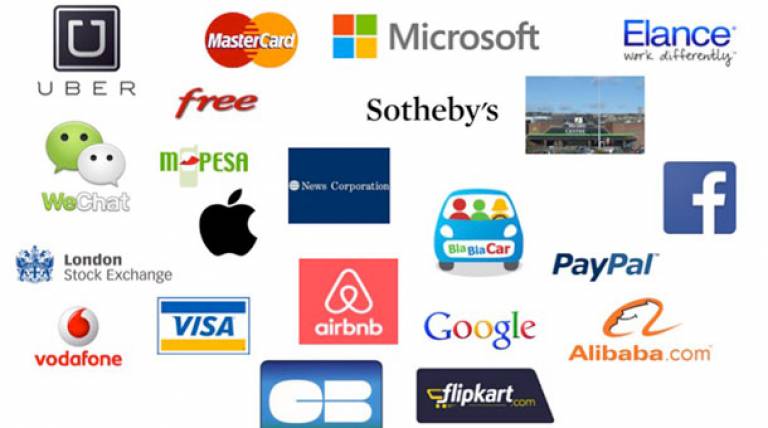Multi-sided platforms: Business, economics & competition policy
25 April 2017, 1:00 pm–6:00 pm

Event Information
Open to
- All
Organiser
-
UCL Centre for Law, Economics and Society and the UCL Jevons Institute for Competition Law and Economics
Location
-
UCL Pearson G22 Lecture Theatre, Gower St, Bloomsbury, London WC1E 6BT
Speaker
Professor David Evans (UCL / University of Chicago)
Organised by the UCL Centre for Law, Economics and Society and the UCL Jevons Institute for Competition Law and Economics
About the course
All of the “sharing-economy” firms, such as Uber, Airbnb, and BlaBlaCar, many of the biggest companies in the world, including Apple, Google, Facebook, and Microsoft, and many of the firms that lead the online economy are matchmakers. These businesses all operate physical or virtual platforms where they connect members of one group of customers, like people looking for a ride, with another group of companies, like drivers. Economists call them “multi-sided platforms” and have developed a new body of economics that explains how they work and why they are different from traditional firms.
Multi-sided platform businesses are often at the heart of debates concerning competition policy and sectoral regulation including, in the EU, the current on-line sectoral inquiry and the interchange fee controversies. Platforms have been the subject of several significant court judgments around the world including by the European Court of Justice in Cartes Bancaires v. European Commission, the Chinese Supreme Peoples’ Court in Qihoo360 v. Tencent, and the Second Circuit Court of Appeals in U.S. Department of Justice v. American Express et al.
This course will cover the unique business models followed by multi-sided businesses; the economics of multi-sided platforms and the industries they anchor; the application of competition policy to multi-sided platforms; a survey of key competition policy and regulatory matters involving these platforms; and tools and techniques for competition policy analysis.
The course will include presentations from several executives of multi-sided platforms including incumbents and startups.
The course will consist of three segments:
- The Business and Economics of Multi-sided Platforms.
- Market Definition, Market Power, and Merger Analysis for Multi-sided Platforms
- Abuse of Dominance and Coordinated Practices for Multi-sided Platforms
The course will draw extensively on examples of multi-sided platform cases involving digital platforms and payment schemes drawn from the EU, US, China, and other jurisdictions.
Who should attend
The course mainly designed for specialists in competition policy and sectoral regulation (lawyers, economists, and officials) but should also be informative for anyone who works for, invests in, must interact with multi-sided platform businesses.
There are no pre-requisites for attending this course. Students are encouraged to purchase David S. Evans and Richard Schmalensee, Matchmakers: The New Economics of Multisided Platforms(Harvard Business Review Press, 2016). A suggested reading list will be distributed two weeks before the course.
About the tutor
Professor David S. Evans has taught antitrust law and economics at the University of Chicago Law School (2006-present) where he is a Lecturer; University College London Faculty of Laws (2004-present) where he is Executive Director of the Jevons Institute for Competition Law and Economics and Visiting Professor; and Fordham Law School (1985-1995) where he was a Professor. He has BA, MA, and PhD degrees, all in economics, from the University of Chicago.
Dr. Evans has written on the economics of the digital economy since its birth more than twenty years ago. He is a co-author, with Richard Schmalensee, of Matchmakers: The New Economics of Multisided Platforms (Harvard Business Review Press, 2016), which is based on his research over many years. According to Professor Lawrence Summers, former President of Harvard and U.S. Treasury Secretary, “More than the internet. the sharing economy or automation platform companies and matchmaking markets are defning the new economy. Evans and Schmalensee are pioneers in developing theories that explain this new economy.” He has authored or co-authored six major books and more than 100 professional articles.
Dr. Evans has served as an expert economist on the leading platform-related antitrust cases. Most recently, he submitted influential testimony to the Chinese Supreme Peoples’ Court, in Qihoo v. Tencent, on behalf of Tencent. This was the first antitrust case decided by the high court in China. Dr. Evans worked as an expert for Microsoft on U.S. v. Microsoft and EC v. Microsoft as well as a number of other high-profile digital economy matters.
Dr. Evans is the Chairman of Global Economics Group, where he provides expert help on litigation and regulation matters, and Founder of Market Platform Dynamics, where he provides business and strategic advice.
 Close
Close

